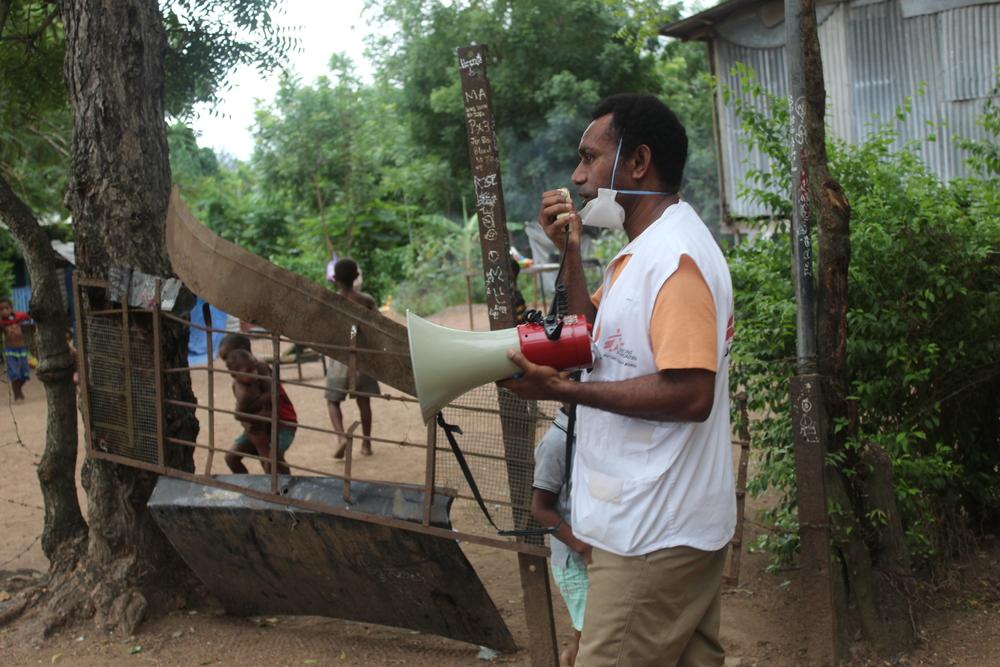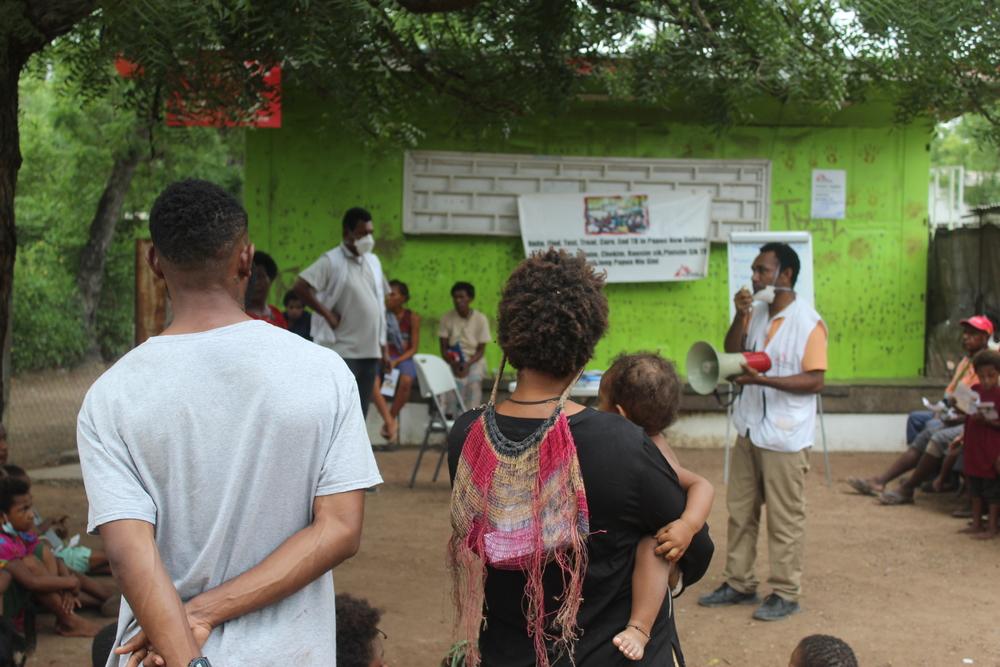Fighting tuberculosis in Papua New Guinea

Doctors Without Borders outreach team discusses tuberculosis symptoms and prevention measures with the community at Morata Stage 1, in Port Moresby, National Capital District. Papua New Guinea, 2022. © Leanne JORARI/MSF
Papua New Guinea (PNG) has one of the highest prevalence rates of tuberculosis (TB) in the world with 30,000 new cases reported every year, according to the World Health Organization. The high prevalence is such that the PNG government has declared a state of emergency in several provinces.
TB is one of the oldest known diseases in the world and is also preventable and curable. Yet, it is the second leading infectious disease killer after COVID-19 and an estimated one in three people globally with the disease are not diagnosed. TB thrives in overcrowded areas as it is spread by airborne droplets, and people with the disease often experience serious symptoms that significantly affect their lives, including severe coughing, chest pain, major weakness, sudden weight loss and fever. TB is one of PNG’s leading causes of death.
Doctors Without Borders has been supporting TB care in PNG since 2014. Working with the PNG Ministry of Health, our staff provide diagnosis and treatment for people with TB in Port Moresby in the National Capital District –at a clinic in Gerehu General Hospital and at the newly opened Six Mile Clinic– and run an education outreach program to prevent the spread of the disease.
An Uphill Battle
As 80 per cent of Papua New Guineans live in rural areas where there are limited health facilities, many patients have to travel considerable distances, often on foot, to the nearest health centres for treatment.
Additionally, low literacy rates in rural areas present a different hurdle. Misunderstandings about the cause of the disease, which can be attributed to witchcraft or the devil, can lead to stigma and discrimination for people with TB.
These barriers contribute to one of Doctors Without Borders’s biggest challenges –ensuring that patients understand the disease and adhere to TB treatment.

Doctors Without Borders outreach team discusses tuberculosis symptoms and prevention measures with the community at Morata Stage 1, in Port Moresby, National Capital District. Papua New Guinea, 2022. © Leanne JORARI/MSF
“TB requires long and complicated medical care. In order to be treated effectively, patients must be given the correct dosage of medication, at the right time, and for the correct duration. For many, this can mean taking medicine every day for at least six months,” says Nelly Akai, an Doctors Without Borders Health Extension officer working with the community. ”It’s common for patients to stop taking their medication once they start to feel better, but the disease may not yet be fully cured at this stage. This can result in drug resistance and potentially, the emergence of new strains of TB – which are more difficult to treat.”
Resistance usually develops due to inadequate TB management, including improper treatment regimens or failure to complete the treatment course –a situation we strive to avoid with our patients.
Since I was diagnosed with TB last year, the team here [in the Gerehu Clinic] and their approach have been very helpful. From medication to counselling, the team made that six-month period go by smoothly and I was cured of the disease. It was quite stressful at the beginning, for me and my family, but the team came to my home, gave us TB awareness and counselling and made it easier for us.Peter Wueh, recovered patient
Outreach and Awareness
In Port Moresby, the Doctors Without Borders outreach team provides home visits for patients with difficulties accessing our clinic or adhering to treatment, in an effort to reduce the high rate of patients ‘lost to follow up’. The team visit areas in Port Moresby we deem are high risk for TB cases, especially low-income areas like urban settlements, which are highly populous areas with poor sanitation where the disease can spread easily.
We visit communities and provide health talks about the signs and symptoms of TB, and the modes of transmission. We address false beliefs too. We speak to or convince community leaders to help us organise Active Case Finding (ACF) missions, where we look for people with signs and symptoms and refer them to the clinics. If someone has been coughing for two weeks or more, we provide sputum cups for samples, we test them and if that person is positive, we immediately offer them treatment. ACF missions are especially important because many people avoid visiting the clinics and waiting in lines to be tested, so we take the testing to them.”Waru Biramo, Community Mobiliser
Breakthrough Technology
The Gerehu TB clinic operates the revolutionary GeneXpert device, which can test for the presence of TB bacteria in less than two hours. It can also detect TB samples for resistance to the TB drug fluoroquinolone (a key TB drug) –essentially helping to diagnose drug-resistant TB. Previously, samples had to be sent to Australia –which added significant time and cost constraints.
The GeneXpert device significantly reduces diagnosis and treatment delays so that patients can now be started on the correct treatment earlier.
“TB is still changing and is here to stay within the country. We need all the support we can get to diagnose and help our people in the country to fight this disease and I believe the device helps us enormously,” says Gerehu Clinic laboratory supervisor, Naomi Lerori.